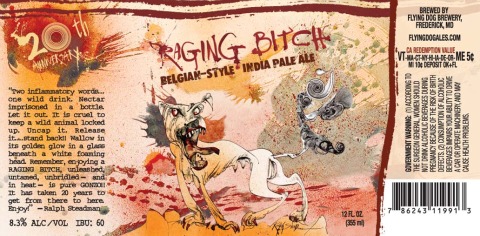Raging Bitches in Michigan
Update July 2012: Although the agency later reversed its decision, Flying Dog still pursued the case and has now lost in Michigan District Court. The brewery plans to appeal. I'll post the decision if I come across a copy.
According to a complaint filed by the Flying Dog Brewery against the Michigan Liquor Control Commission, the Commission has prevented the brewery from selling their popular Raging Bitch Twentieth Anniversary Belgian-Style India Pale Ale in Michigan, now the company's top selling beer. The complaint details the history of the brewery and how its founder's relationship with artist Ralph Steadman has contributed the creative naming and label designs in the "Gonzo" spirit. Even if the beer weren't so delicious, I'd still feel the same way about the case.
In late 2009 and affirmed in the summer of 2010, the Commission refused to approve the brewery's Raging Bitch label:
Safety? That one doesn't even require discussion. And then there's the bureaucrat's favorite: welfare. Do you need the government to protect your health, safety or welfare from this label?
If a state or its agencies can prohibit this (commercial) art, then what else would be off-limits? The artwork is no worse than many things you'd find on a newstand, let alone a bookstore, and we all know the government has no place there (other than barring sales of certain materials to minors and totally obscene stuff that most stores don't carry; of course, minors can't buy booze to begin with). I'm not sure what business a liquor commission has regulating speech that is not misleading or deceptive. Beyond ensuring the identity and purity of products, compliance with health-related disclosures, licensing and import/export administrivia, etc., patronizing the general public by protecting them from the word "bitch" is certainly not within the purview of a state liquor commission. Is "bitch" still considered such a dirty word? Here, it's even being used accurately-- a female dog is, after all, a bitch. In addition to a drawing of a female dog, the label contains the following description:
A 1998 Second Circuit case provides a sneak peek at how the District Court in Michigan will hopefully get rid of this unnecessary case. There, the court found that Bad Frog Brewery's label depicting a frog giving the middle finger was protected as commercial speech under the Supreme Court's Central Hudson test and the state liquor authority exceeded its authority by rejecting the label in the interests of temperance and protecting children from advertisements that allegedly promoted underage drinking. Although the same child-protective arguments weren't put forth by the commission here (at least not yet), the Commissioners have their task ahead of them. Advancing broad public policy arguments about protecting children would likely fail later in the litigation as they do in many other free speech cases, especially since there are typically other less restrictive alternatives available to regulators. Flying Dog claims that the regulation is invalid on its face as a prior restraint on speech, inherently vague (definitely!) and ambiguous on its face, and is invalid as applied. Sounds about right to me.
Alright, time for a Raging Bitch. (I'm serious.)
Thanks to my friend Marc for the tip about the case.
According to a complaint filed by the Flying Dog Brewery against the Michigan Liquor Control Commission, the Commission has prevented the brewery from selling their popular Raging Bitch Twentieth Anniversary Belgian-Style India Pale Ale in Michigan, now the company's top selling beer. The complaint details the history of the brewery and how its founder's relationship with artist Ralph Steadman has contributed the creative naming and label designs in the "Gonzo" spirit. Even if the beer weren't so delicious, I'd still feel the same way about the case.
In late 2009 and affirmed in the summer of 2010, the Commission refused to approve the brewery's Raging Bitch label:
The Commission finds that the proposed label which includes the brand name “Raging Bitch” contains such language deemed detrimental to the health, safety, or welfare of the general public.Health? It provides the required federal info and is not misleading-- it lists the ABV, and there's the familiar GOVERNMENT WARNING about not drinking while pregnant or operating heavy machinery. Yea, those seem like pretty reasonable requirements to impose on brewers. As the complaint mentions, beer labels must comply with federal malt beverage labeling regulations in addition to state law, but that's not an issue here. On an unrelated note, I've always found it interesting that ingredients don't have to be listed on beer. Of course, I'd only expect certain ingredients to begin with, tend to research it if I'm interested, and understand some companies' desires for trade secrecy. Flying Dog is one of many craft brewers that address this curiosity by listing each beer's ingredients on its web site. Check out the Raging Bitch's ingredients here. The company is even taking things a step further with their recently revived Open Source Beer Project, where homebrewers and fans can provide feedback on a beer recipe that the company will brew. Awesome.
Safety? That one doesn't even require discussion. And then there's the bureaucrat's favorite: welfare. Do you need the government to protect your health, safety or welfare from this label?
If a state or its agencies can prohibit this (commercial) art, then what else would be off-limits? The artwork is no worse than many things you'd find on a newstand, let alone a bookstore, and we all know the government has no place there (other than barring sales of certain materials to minors and totally obscene stuff that most stores don't carry; of course, minors can't buy booze to begin with). I'm not sure what business a liquor commission has regulating speech that is not misleading or deceptive. Beyond ensuring the identity and purity of products, compliance with health-related disclosures, licensing and import/export administrivia, etc., patronizing the general public by protecting them from the word "bitch" is certainly not within the purview of a state liquor commission. Is "bitch" still considered such a dirty word? Here, it's even being used accurately-- a female dog is, after all, a bitch. In addition to a drawing of a female dog, the label contains the following description:
“Two inflammatory words ... one wild drink. Nectar imprisoned in a bottle. Let it out. It is cruel to keep a wild animal locked up. Uncap it. Release it .... stand back!! Wallow in its golden glow in a glass beneath a white foaming head. Remember, enjoying a RAGING BITCH, unleashed, untamed, unbridled—and in heat—is pure GONZO!! It has taken 20 years to get from there to here. Enjoy!” – Ralph SteadmanIt's really disappointing to see a creative and high quality brand have to deal with barely explained, subjective administrative decisions such as these. Even more puzzling is one commissioner's acknowledgment of Gonzo journalism and not being personally averse to "having or reading edgy writing." Still, the commission affirmed their earlier rejection of the label based on a nebulous "responsibility here to place product in a public place with the names that are on it..." Under Michigan law, the commission reserves the right to reject any label "that is deemed to promote violence, racism, sexism, intemperance, or intoxication or to be detrimental to the health, safety, or welfare of the general public.” I think they'd have a better shot calling the label sexist, although I'm sure even the commissioners saw the ridiculousness of that position. It's pretty telling that none of the other states where Flying Dog is sold rejected the label (Flying Dog is available in 45 states, though I couldn't find specifics on just the Raging Bitch). While they're at it, maybe the commissioners in Michigan should require the brewery web site to change the truthfully ambiguous menu labeled "Good Beer, No shit." Good luck with that.
A 1998 Second Circuit case provides a sneak peek at how the District Court in Michigan will hopefully get rid of this unnecessary case. There, the court found that Bad Frog Brewery's label depicting a frog giving the middle finger was protected as commercial speech under the Supreme Court's Central Hudson test and the state liquor authority exceeded its authority by rejecting the label in the interests of temperance and protecting children from advertisements that allegedly promoted underage drinking. Although the same child-protective arguments weren't put forth by the commission here (at least not yet), the Commissioners have their task ahead of them. Advancing broad public policy arguments about protecting children would likely fail later in the litigation as they do in many other free speech cases, especially since there are typically other less restrictive alternatives available to regulators. Flying Dog claims that the regulation is invalid on its face as a prior restraint on speech, inherently vague (definitely!) and ambiguous on its face, and is invalid as applied. Sounds about right to me.
Alright, time for a Raging Bitch. (I'm serious.)
Thanks to my friend Marc for the tip about the case.

